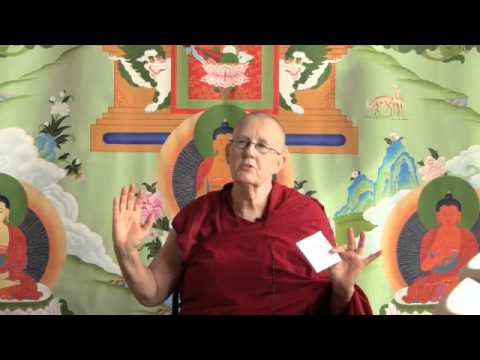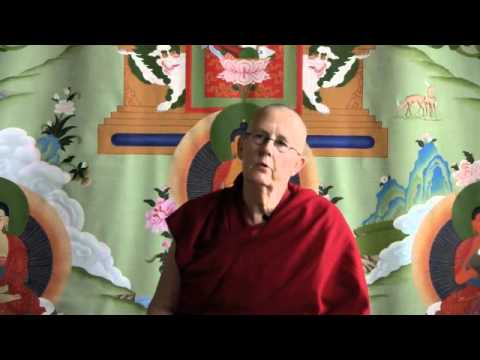Confidence in purification
Confidence in purification
Part of a series of teachings given at the Winter Retreat from December 2011 to March 2012 at Sravasti Abbey.
- The importance of purification
- How to have confidence that purification practice works
Vajrasattva 05: Confidence in purification (download)
Last time I talked a little bit about the importance of approaching the Vajrasattva practice with this balanced mind by recalling our many virtuous actions and our ethical living that we have done. That’s evidenced by our current state of having a precious human life. Often it seems like it’s hard to remember that. I think what’s going on, at least in my mind when that’s true, it’s the self-centered attitude that’s really taking over the mind. The self-centered attitude sees us as very solid and permanent and non-changing. When that happens then we get very narrow in our focus. We don’t see ourselves in a realistic manner at all—it’s very narrow in its focus. It’s really a view that’s stuck in a very poor quality view. It takes a lot of courage and effort to resist this self-centered attitude. It’s been around for a long time so it rears up, at least in my mind, quite a lot. It’s very sneaky. I often don’t realize that it’s really running the show.
As beginners on the path, our task really for a long time is to accumulate merit and to purify our negativities. To accumulate merit one way is by taking precepts—so the lay precepts, the monastic precepts, the eight Mahayana precepts that we took the other day, bodhisattva precepts. When we take these precepts they’re really protection for the mind, they steer us in a virtuous direction, and we practice them. We don’t take them and then perfect them immediately. If we could do that we wouldn’t need to take them—so we practice.
Of course since we’ve been circling in this samsara for many eons we create negative karma. When we create negative karma then that’s when we purify. So these two practices [accumulating merit and purification] go hand in hand. Often we create negative karma out of carelessness. Or sometimes just by living on automatic—not being very aware of the results of the actions that we’re doing. Sometimes we create negative karma because the mind is full of afflictions like anger, attachment, jealousy, greed—all of those afflictions.
Since our mind will not be completely purified until enlightenment we’re going to be involved in these purification practices for a long time. If we’re really sincere about ending our suffering and ending the suffering of others then we joyfully do these purification practices every day. As we get more and more familiar with it, actually when we notice that we have done a negative action we can in our mind right there purify on the spot. This is a very powerful way to hold these practices. Then of course when we have the opportunity we do Vajrasattva retreat this is a very powerful process also.
How do we develop confidence that the purification practice works? What first came to my mind is it’s a practice. So like all practice we gain confidence through the experience over time. It’s experiential. Also we can look to the masters who have realizations, who have spoken about these practices. That helps us gain some confidence.
In Geshe Sopa’s book The Steps on the Path to Enlightenment he cites the sutra “Giving the Four Teachings.” Here the Buddha is speaking directly to Maitreya. He’s telling him that if he makes use of purification practice all negative karma accumulated can be subdued, mitigated, and completely destroyed. These are the words of the Buddha. We all know Buddha doesn’t lie, yes, so we can actually believe this.
Another master, a Kagyupa master said:
Because the nature of all functional things is impermanent, if someone engages in the practice of purification, accumulates merit, practices visualizing, and does the sadhana with great effort—what may now seem impossible to achieve, like high realizations, will come about one day.
Again, if you hear that and you think, “Well sure, a master. Of course he could do that. But I’m not like that.”
If that’s what comes up in your mind recognize that is the self-centered attitude again. It’s rearing its ugly head trying to keep you exactly where you are—unchanging poor view of self. Kind of stuck in this place.
When you think about it our Buddha nature and these masters’ Buddha nature is the same. The only thing that’s different is that they have been practicing, purifying, and accumulating merit for a much longer time then we have. That’s all. But the Buddha nature, it’s the same—same in all of us, same in all the masters. We all have that. So with these practices we’re trying to uncover our Buddha nature.
Another master said:
At the end of however many mantras you recite when you’re doing the Vajrasattva practice, develop the strong conviction, “I have actually purified all negativities.” It’s important to generate this conviction because having lingering doubts about whether the negativities have actually been purified is harmful.
So it’s up to you. You can let the self-centered attitude really rule your mind or you can have confidence in the Buddha’s teaching. You can have confidence in these great masters. You can have confidence in your teachers. You can have confidence in yourself. It’s up to you.
Venerable Thubten Jigme
Venerable Jigme met Venerable Chodron in 1998 at Cloud Mountain Retreat Center. She took refuge in 1999 and attended Dharma Friendship Foundation in Seattle. She moved to the Abbey in 2008 and took sramanerika and sikasamana vows with Venerable Chodron as her preceptor in March 2009. She received bhikshuni ordination at Fo Guang Shan in Taiwan in 2011. Before moving to Sravasti Abbey, Venerable Jigme (then Dianne Pratt) worked as a Psychiatric Nurse Practitioner in private practice in Seattle. In her career as a nurse, she worked in hospitals, clinics and educational settings. At the Abbey, Ven. Jigme is the Guest Master, manages the prison outreach program and oversees the video program.


